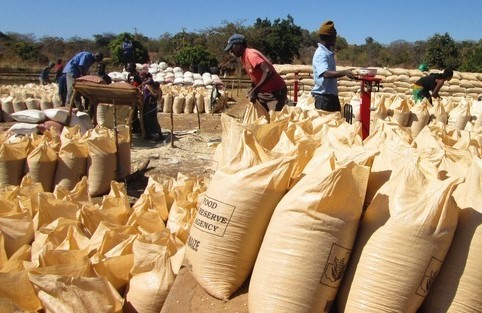• Government will rely on commercial farmers to meet this demand.
• Farmers must come on board and take advantage of this opportunity.
• Initiatives such as the 30 million Euros facility under Zanaco are key in supporting value chain development.
Minister of Agriculture has disclosed that Kenya seeks to import 1 million metric tonnes of maize from Zambia but small scale farmers in the country are not able to produce the required quantities.
Officiating at the 30 million Euros partnership between Zanaco and European Investment Bank (EIB), dubbed ‘Zambia Agriculture Value Chain Facility’ Reuben Phiri said government will therefore rely on commercial farmers to meet this demand, further urging farmers to come on board and take advantage of this opportunity as the price of maize will not be less than US$300 per tonne.
Mr. Phiri stated that exports of maize and other crops will increase over the next years due to the initiatives that government is currently implementing, adding that Zambia is currently on course as by demonstrated by exports of the crop to neighboring countries and as far as Sudan.
He further disclosed that Zambia is only using 7 million hectares of its 45 million land available for agriculture purposes, hence government will not stop encouraging Foreign Direct Investments (FDIs) but will not give out all the land.
“When you hear that the Ministry of Agriculture has given huge chunks of land to Kenya and other countries, read between the lines. What we are doing is across the globe inviting those who can come and farm in our country and utilize the land which we have in our country, the water, good soils and good climate.
“Let’s always look at the positive side, we should not shoot ourselves in the feet by denying those who can come and invest, so we will not be dissuaded from that path,” Mr. Phiri stated.
Mr. Phiri also said initiatives such as the 30 million Euros facility under Zanaco are key in supporting value chain development and government has a clear direction regarding expansion of agricultural production and exports to international markets.
He added that government has been working tirelessly to translate Zambia’s potential into the country becoming the food basket of the region by supporting implementation of various initiatives in the agriculture sector.
“These efforts are crucial to enable the country take advantage of the African Continental Free Trade Area through increasing exports of agricultural products to other African countries.”
“We have noted that we need to focus on improving crop yields through introduction of new technologies rather than opening up new land. This is the message we are sending to our farmers. This is also the message we are sending to those who wish to come and invest in Zambia,” he stated.
Speaking at the same event, European Union (EU) Ambassador to Zambia Jacek Jankowski said the European Investment Bank with support through EU’s grant finance, mobilized a loan of 14 million Euros and Zanaco is its first partner financial intermediary which will today on lend a portion of 6.5 million Euros of the total amount to five agribusinesses from Zambia.
“It is our pleasure to showcase through this event, how access to finance can contribute to and trigger sustainable growth and job creation of agribusinesses, which are at the same time committed to integrate smallholder farmers, particularly women, into agricultural value chains. The on-lending of loans of 15 million Euros through ZANACO, is expected to integrate and create jobs for up to 11, 000 smallholder farmers,” he explained.
Meanwhile, Zanaco Chief Executive Officer Mukwandi Chibesakunda said in October 2021, the bank received 13 million Euros from the European Investment Bank to support smallholder farmers across the entire value chain and 50 percent of this amount has been disbursed to the beneficiary farmers.
Ms. Chibesaka stated that the Bank’s partnership with the European Investment Bank has seen a number of farmers accessing the facility, and this has resulted in a multiplier effect on communities.
She urged farmers to take advantage of the facility and help build Zambia, which is home to agriculture productivity.
“With government’s continued commitment to improve agriculture productivity through various comprehensive reforms as outlined in the 2023 national budget and 8th National Development Plan which should result in agriculture growth rate of at least 10 percent annum and agriculture exports expected to increase to above US$2 billion by 2026 from US$756 billion in 2021, we believe that we have the duty to supplement government efforts of unlocking Zambia’s agriculture potential.”
“I would like to commend the European Investment Bank for partnering with us to roll out the first dedicated support to agriculture in our country.”
The Zambia Agriculture Value Chain Facility is an initiative to improve access to sustainable finance in Zambia and it comes under the European Union’s Support to the Sustainable Commercialization of Zambia’s smallholder farmers programme.
Agricultural companies across Zambia will be able to access loans with maturities of up to 7 years, longer than commonly available in the market.







